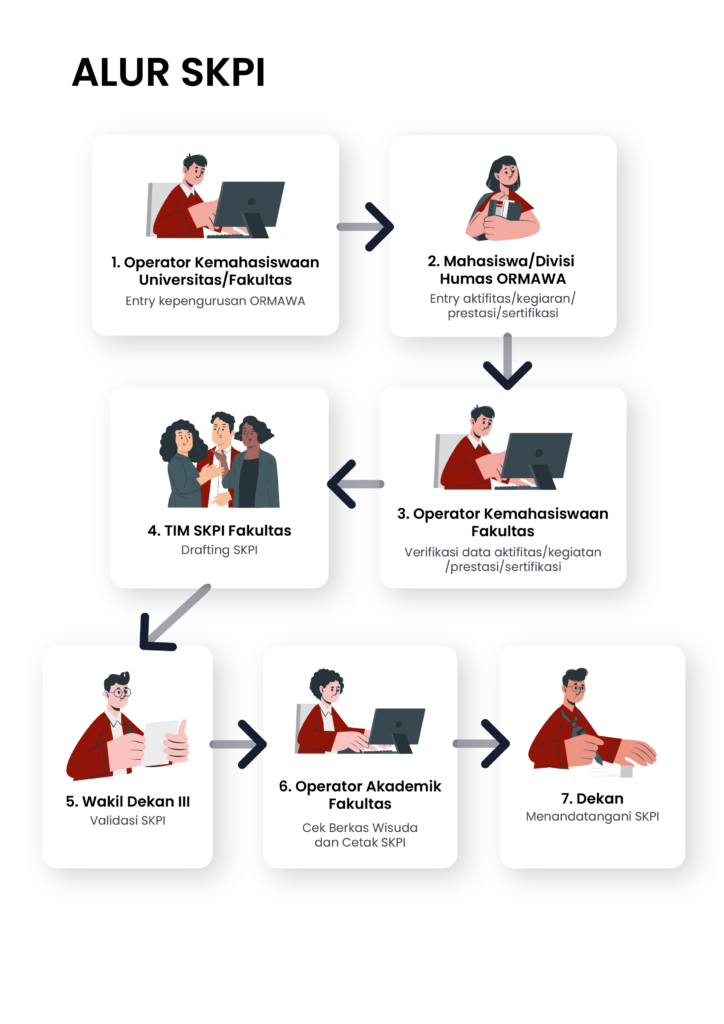Students graduating from University of Jember will be provided with an SKPI (Surat Keterangan Pendamping Ijazah) in addition to a Surat Keterangan Lulus (SKL), diplomas and transcripts. SKPI is an official statement issued by a tertiary institution which contains information about the academic achievements or qualifications of graduates with degrees (Kemenristekdikti, 2015). SKPI is also stated in the Decree (SK) of the Chancellor of the University of Jember which is basically a record of students while studying on campus. With the SKPI will greatly help stakeholders to get an overview of students who have any competencies beyond the competencies stated in the diploma. Faculties through Study Programs as the spearhead of implementing education on campus make designs or work program activities to increase student competence and can be poured into the SKPI. Continuous coordination and collaboration with stakeholders must be carried out.
Several programs or work activities that can support SKPI:
1. Training related to Leadership, Entrepreneurship, and Survival. Community Service Activities and Thematic Real Work Lectures (KKN).
2. Communication Skills development program so that students have ideas, opinions that are effective orally and in writing.
3. Programs based on an attitude of cooperation/ Team Work.
4. The ability to produce a product or solve a problem (Problem Solving).

SKPI at University of Jember contains two main points, namely the first point about Attitudes and Values. This point is taken from the academic achievements of students recorded in the Sistem Informasi Terpadu (SISTER) at the University of Jember, especially in subjects that are used as the basis for attitudes and values such as Religion, Pancasila and Citizenship Education. The assessment is Good or Very Good which will eventually be converted into the GPA for the course.
The second SKPI point is about Activities, Achievements and Awards . At this point students can upload their certificates to SISTER. The SKPI team from the Faculty will verify the certificate based on eight points of value (elements) in SKPI, namely:
1. Graduates have added value in their field as shown by a competency/professional certificate. Example: foreign language competency certificate, IT software expert certificate or programmer .
2. Graduates have values outside their fields related to skills and attitudes in entrepreneurship through their participation or achievements. Examples: entrepreneurship competency certificates, resource person certificates, seminar certificates, training participant certificates.
3. Graduates have skills and attitudes adaptive to change, are environmentally and socially aware as responsible problem solvers . Example: certificate of chairman/administrator/participant of social service activities, certificate of Thematic KKN.
4. Graduates have the ability to influence or encourage others to work hard in achieving an activity. Example: national and international student activity/leadership organizing committee certificates.
5. Graduates have the ability to express opinions/ideas both orally and in writing through communication. Example: a certificate showing academic or non-academic ideas at national and international levels.
6. Graduates have the ability to work cooperatively with others and become part of a group to complete certain tasks or goals. Example: a certificate issued by a government/private agency or organization for involvement in humanitarian activities.
7. Graduates have the ability to produce something new or original or solve problems. For example: a certificate as a presenter or speaker in a national or international seminar, a certificate for a participant in a work/innovation product competition, a certificate asteam leader of community empowerment activities.
8. Graduates have a high commitment and responsibility in facing obstacles and obstacles in achieving goals. For example: certificates for apprenticeship participants, KKL and KKN.
SKPI as a whole will display the identity of graduates, identity of organizers, qualifications of learning outcomes, mastery of knowledge, general skills and information on the higher education system.
